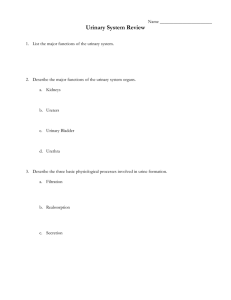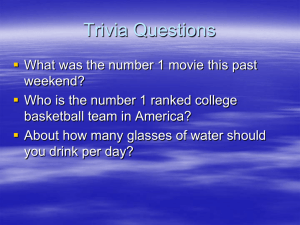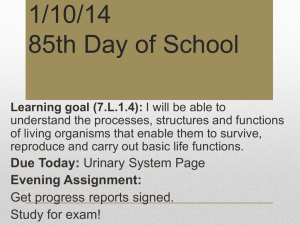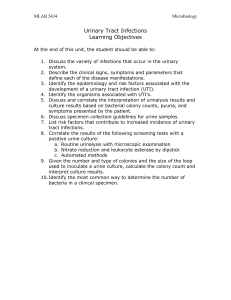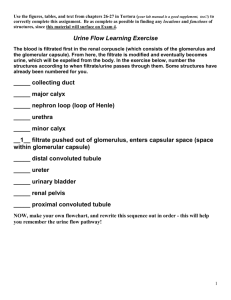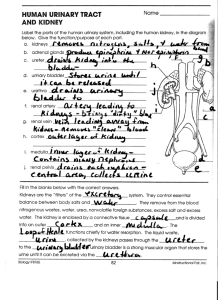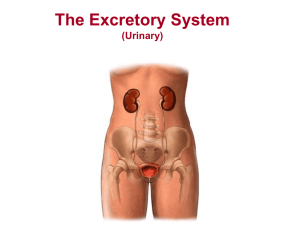4.02 Understand the Functions and Disorders of the Urinary System
advertisement
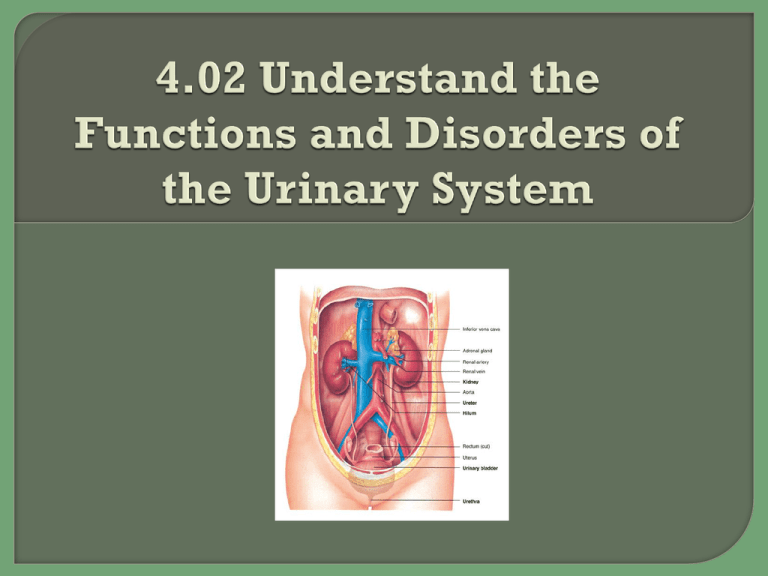
Essential Questions What are the functions of the urinary system? What are some disorders of the urinary system? How are disorders of the urinary system treated? How do you relate the body’s hormone control to the urinary system? 4.02 Understand the functions and disorders of the urinary system 2 Functions: Excretion Formation Fluid of urine and electrolyte balance Elimination of urine 4.02 Understand the functions and disorders of the urinary system 3 Excretion What Why is excretion? does the body have excretory functions? What is the composition of wastes excreted by the urinary system? How is it relevant to health? 4.02 Understand the functions and disorders of the urinary system 4 Filtration Reabsorption Secretion 4.02 Understand the functions and disorders of the urinary system 5 • Blood from renal artery enters glomerulus (more narrow vessels increase pressure) • High pressure in glomerulus forces fluid into Bowman’s capsule, where it is filtered 4.02 Understand the functions and disorders of the urinary system 6 BOWMAN’S CAPSULE Bowman’s capsule filters out 125cc of fluid/min. …how many cc’s per hour is this? As the filtrate continues through nephron, 90% of water is reabsorbed—what would happen if reabsorption here failed? 4.02 Understand the functions and disorders of the urinary system 7 What substances are reabsorbed? water, sugar, salts Where do they go? Back into the blood If blood levels of certain substances are high, the substances will not be reabsorbed. How does this help maintain homeostasis? Keep blood levels from getting too high 4.02 Understand the functions and disorders of the urinary system 8 What is secretion? Describe how this process is the opposite of reabsorption…. Substances are excreted from blood into peritubular capillaries into the urine 4.02 Understand the functions and disorders of the urinary system 9 What substances are secreted into the collecting tubules? Ammonia, creatinine, drugs 4.02 Understand the functions and disorders of the urinary system 10 Fluid and electrolyte balance Electrolytes are selectively secreted to maintain body’s acid-base balance. • What are electrolytes? • Electrolytes are minerals in your blood and other body fluids that carry an electric charge 4.02 Understand the functions and disorders of the urinary system 11 Fluid and electrolyte balance Chemical control • • ADH (hypothalamus) Aldosterone (Adrenal cortex) Nervous control 4.02 Understand the functions and disorders of the urinary system 12 Fluid and electrolyte balance Chemical control • ADH – Antidiuretic hormone • Aldosterone 4.02 Understand the functions and disorders of the urinary system 13 Fluid and electrolyte balance Chemical control ADH is released by the posterior pituitary gland What is the function of ADH (antidiuretic hormone)? 4.02 Understand the functions and disorders of the urinary system 14 Fluid and electrolyte balance Chemical control The amount of ADH produced is related to the level of body hydration What factors regulate the release of ADH? 4.02 Understand the functions and disorders of the urinary system 15 Forming more dilute urine: Define “dilute urine” What are diuretics? Increase urine output What effect do they have on the production of urine? Give examples of substances that have diuretic effects. 4.02 Understand the functions and disorders of the urinary system 16 Fluid and electrolyte balance Chemical control Aldosterone Where does it come from? Adrenal gland What does it do? Controls urinary secretion Aldosterone release is the result of the reninangiotensin system. What does this mean? Renin is released by the kidneys when there is a decrease in BP stimulates aldosterone production and constricts vessels Problems with adrenal glands causes imbalance in salt and water balance in body 4.02 Understand the functions and disorders of the urinary system 17 Fluid and electrolyte balance What effect does this cycle have on your blood pressure? 4.02 Understand the functions and disorders of the urinary system 18 Fluid and electrolyte balance Nervous control How does the nervous system control urinary secretions? Nerve impulses from blood vessels leading to kidneys and glomeruli What other systems are involved in the production and excretion of urine? 4.02 Understand the functions and disorders of the urinary system 19 Review urine formation, electrolyte exchange, and some factors that effect urine volume. 4.02 Understand the functions and disorders of the urinary system 20 What do you predict will happen to blood pressure when the blood volume increases? What if blood volume decreases? 4.02 Understand the functions and disorders of the urinary system 21 If more water is reabsorbed back into the body---what will happen to urine concentration? (more or less concentrated?) 4.02 Understand the functions and disorders of the urinary system 22 Elimination of urine What causes the bladder to empty? Involuntary muscle control contracts when feeling of fullness occurs Is this a voluntary or involuntary action? Both What can prevent urination? Nerve damage How is urinary retention treated? catheter 4.02 Understand the functions and disorders of the urinary system 23 Elimination of urine Urinary output Average urinary output = 1500 ml per day *How many ounces is this? What effects the color of your urine? 4.02 Understand the functions and disorders of the urinary system 24 An examination of urine What does normal urine look like? What constitutes an abnormal urinalysis? 4.02 Understand the functions and disorders of the urinary system 25 4.02 Understand the functions and disorders of the urinary system 26 4.02 Understand the functions and disorders of the urinary system 27 4.02 Understand the functions and disorders of the urinary system 28 4.02 Understand the functions and disorders of the urinary system 29 Cystitis What is cystitis (cyst= medical term for ____ +itis =___ ) Most common cause: E. Coli What are the major symptoms of cystitis? Painful urination 4.02 Understand the functions and disorders of the urinary system 30 Cystitis More common in females—Why ?? Shorter urethra 4.02 Understand the functions and disorders of the urinary system 31 Glomerulonephritis Disease which injures the glomerulus. Affects filtration; allows for passage of protein and blood into urine What will happen as a result of damaged glomeruli? 4.02 Understand the functions and disorders of the urinary system 32 Glomerulonephritis Two types: • Acute : occurs in children 1-3 wks bacterial infect • Chronic: permanent damage to glomeruli Define these terms. How do these terms relate to glomerulonephritis symptoms? What is the prognosis for each? poor for chronic leads to kidney failure 4.02 Understand the functions and disorders of the urinary system 33 Renal calculi Also known as nephrolithiasis nephro lith iasis What are renal calculi made of? calcium/uric acid What are the symptoms? pain flank, burning, N/V, chills, hematuria 4.02 Understand the functions and disorders of the urinary system 34 Renal calculi What will happen if the ureters are blocked? Hydronephrosis: renal pelvis becomes distended due to urine build up from blockage 4.02 Understand the functions and disorders of the urinary system 35 Renal calculi How is it treated? Push fluids, remove blockage 4.02 Understand the functions and disorders of the urinary system 36 Renal calculi How does lithotripsy work? Is it a cure? NO Shock waves hit and break up stone so that it can pass 4.02 Understand the functions and disorders of the urinary system 37 Renal failure Acute • What causes it? Shock, nephritis, injury, bleeding, heart failure, poisoning • What are the symptoms? Oliguria: low urine production Anuria: no urine production 4.02 Understand the functions and disorders of the urinary system 38 Renal failure chronic May be none in early stages, urinalysis may reveal proteinuria Why would protein be present in the urine? Why is this not normal? 4.02 Understand the functions and disorders of the urinary system 39 Renal Failure Chronic kidney disease leads to a buildup of fluid and waste products in the body. How are these systems affected by renal failure? 4.02 Understand the functions and disorders of the urinary system 40 Renal Failure How is it treated? • Peritoneal dialysis • What is the process involved in this treatment? 4.02 Understand the functions and disorders of the urinary system 41 Renal Failure How is it treated? • Hemodialysis • What is hemodialysis? • What determines the patient’s treatment schedule? 4.02 Understand the functions and disorders of the urinary system 42 Renal Failure Compare the treatment of acute and chronic renal failure. 4.02 Understand the functions and disorders of the urinary system 43 How does hemodialysis mimic glomerular function? 4.02 Understand the functions and disorders of the urinary system 44 Renal transplant What is involved in this treatment option? When does a patient get a transplant? 4.02 Understand the functions and disorders of the urinary system 45 Renal transplant What is the major complication of renal transplantation? 4.02 Understand the functions and disorders of the urinary system 46 Essential Questions What are the functions of the urinary system? What are some disorders of the urinary system? How are disorders of the urinary system treated? How do you relate the body’s hormone control to the urinary system? 4.02 Understand the functions and disorders of the urinary system 47
